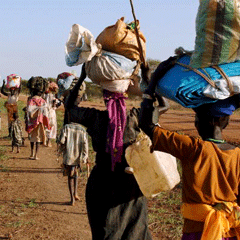The Cities Alliance Catalytic Fund closed 8 May 2015. Applications are currently being processed according to established standards.
[Brussels, Belgium 11 March 2015] – The Cities Alliance Catalytic Fund is now accepting applications focused on the theme “Migration and the Inclusive City.”
Around the world, an estimated one billion people are migrating. Many seek new economic, multi-generational opportunities, while others are pushed by conflict, political upheaval, or environmental and human disasters. While recent attention has focused on international migrants, globally the UN estimates that 85 per cent remain within their countries of origin, contributing to the largest movement of people in history.
Regardless of their diverse characteristics and experiences, nearly all migrants head towards cities – either as a new home, a temporary place of residence or a transit space. In the absence of alternatives, many end up in overcrowded slums and settlements, without formal basic services or opportunities for employment or education.
Women, who make up nearly half of all international migrants, are particularly affected. Many experience additional and very specific gender, ethnic and racial discrimination in accessing labour markets and social protection systems, despite the fact that women migrants are a driving force for economic prosperity, such as through remittances.
While migration is generally addressed through national policies, the lived reality of integration in settlements is largely managed at the local level, even in the case of international migrants. Integration into settlements is a uniquely local experience that frequently leads to tensions with the existing, settled population over access to resources and employment opportunities, and can sometimes lead to xenophobic responses or even violence. Conversely, it is also in cities where solutions for intercultural dialogue are practiced, ethnic entrepreneurship flourishes, and new forms of conflict resolution can be found.
“Cities that work out how to extend an urban citizenship and opportunities to their new residents in an equitable manner provide the best chance for migrants in informal settlements to evolve into tomorrow’s middle classes,” notes William Cobbett, Director of the Cities Alliance. “However, getting this balance right is one of the most difficult and sensitive challenges facing cities today”.
The difference depends on a city’s policy response to migration, and its ability to respond practically. In many countries, those cities experiencing the most pressure from migration are overburdened with historic backlogs and limited resources, and are already struggling to fulfill their citizens’ basic needs.
By focusing the 2015 Call on Migration and the Inclusive City, the Cities Alliance seeks to promote innovative policy responses and practical approaches that adopt an inclusive response to migrants, including access to land, services, employment opportunities as well as recognition and voice.
Focus Areas
Proposals should promote innovation and catalytic impact in support of the strategic goal of the Catalytic Fund, which is to stimulate transformational change in cities. Innovation is measured in the development of concepts, products and processes which are either new in absolute terms or a novelty in their application and adaptation to a different context. Innovation should also be able to create societal value and trigger longer-term impacts.
Proposals are invited on one or more of the following four focus areas. Proposals can address international and/or national migration; all should demonstrate clear attention to the issue of gender equality. Additionally, proposals could also address the special needs, capacities and potentials of the most vulnerable migrant groups (such as children).
LIVE: Migrants’ access to basic urban services, livelihoods and social protection.
WORK: The access, integration and role of migrants in the city labour market and local economy.
CONNECT: Social integration and inclusion of migrants in the city.
PARTICIPATE: Migrants’ inclusion into city planning and local decision-making processes.
How to Apply:
CATF grants support policies that catalyse city transformation and activities to enhance innovation and learning. Proposed projects must meet these objectives and fall within the scope of the Cities Alliance Charter. Proposed projects must also:
-- Limit grant size requests to US $50,000 – US $200,000.
-- Be sponsored by at least one Cities Alliance member. Multiple sponsors are strongly encouraged.
All concept notes must be submitted by 8 May 2015, midnight Central European Time. Applicants must use the Cities Alliance Concept Note Template, which is available in English, French and Spanish. Concept notes should be submitted via e-mail to the Cities Alliance Secretariat at CATF@citiesalliance.org.
About the Cities Alliance
The Cities Alliance is the global partnership for urban poverty reduction and the promotion of the role of cities in sustainable development. Based in Brussels, the Cities Alliance also has regional offices in São Paulo, Delhi, and Pretoria. This is the fourth Call for Proposals for the Catalytic Fund and the third with a thematic focus; previous themes included Youth and the City (2012) and Know Your City! (2014).
In addition to the Catalytic Fund, the Cities Alliance also supports Country Programmes, which provide long-term programmatic support on a national or multi-city scale, as well as knowledge and advocacy activities. The Cities Alliance has been hosted by UNOPS since 2013.
Contacts:
Federico Silva, Cities Alliance Senior Programme Specialist
Lisa Reudenbach, Cities Alliance Urban Analyst
Tel: +32 2 234 63 62
E-mail: CATF@citiesalliance.org

Women comprise 48 per cent of all international migrants. (IOM 2014) Photo: UN
Deadline for submissions is midnight 8 May 2015, CET.
“Cities that work out how to extend an urban citizenship and opportunities to their new residents in an equitable manner provide the best chance for migrants in informal settlements to evolve into tomorrow’s middle classes... Getting this balance right is one of the most difficult and sensitive challenges facing cities today”. --William Cobbett, Cities Alliance Director
Related Items




